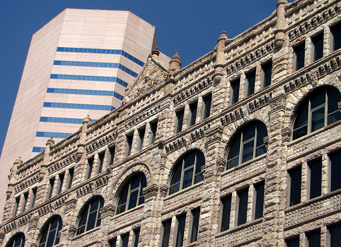Adaptive Use
Lakeville State Hospital Reuse: Lakeville, Massachusetts
Evaluated economic and fiscal impacts from the construction and operations of a reuse of the facility for various uses. Also outlined quality of life benefits the project would create. In the case of housing, economic impact analysis focused on construction impacts. Fiscal impacts also were evaluated for commercial and/or office/industrial uses that might be included in the reuse plan.
Stanley Woolen Mills: Uxbridge, Massachusetts
Conducted the market analysis portion of the Stanley Woolen Mill Reuse Feasibility study. The Stanley Woolen Mill is a 98,000 square foot historic industrial structure that is expected to be an important component of the overall development of the Blackstone River Valley National Heritage Corridor. We evaluated the tourist and resident market potentials for likely site reuses, as well as supportable and potential rent levels, potential capture rates, and potential spending over a five-year period.
Putnam Hall Reuse: Orange, Massachusetts
Evaluated adaptive reuse potential of historic Putnam Hall. ConsultEcon was part of a multi-disciplinary team that included environmental consultants and architects. Private reuse as well as community use was considered. Adaptive reuse scenarios were prepared, and economic returns estimated. Recommendations were made on the disposition of the property.
Fall River State Pier: Fall River, Massachusetts
Worked as part of a multidisciplinary team to provide an operations plan for the Fall River State Pier Multi-Use Facility, which was developed at the request of the Massachusetts Department of Business and Technology and Massachusetts Seaport Advisory Council. The purpose of this business and operational strategic plan was to provide a blueprint to guide development of the facility up to the point of hand-off to commercial operators.
Historic Bank Reuse: Chambersburg, Pennsylvania
Assisted in the development of Chambersburg as a destination for heritage tourism activities. The plan identified heritage resources and outlined heritage development strategies and the necessary implementation processes. We also devised the thematic program for the Chambersburg Heritage Center, which will serve to attract, inform, and orient visitors through interpretive exhibits of the history and heritage of Chambersburg.
Mill Building Reuse for Underwater Preserve Education Center: Alpena, Michigan
This education center is dedicated to the interpretation of the maritime history of the Great Lakes, the nearby shipwrecks and the Great Lakes maritime environment. The adaptive reuse of an existing industrial port-related building was evaluated. This has opened as an interpretive facility offering an introductory film, interpretive exhibits and visitor amenities. This study estimated the market support for the facility and created an operating plan that responds to available resources, the interpretive opportunity at this site, and the overall NOAA National Marine Sanctuary system.
Salem State College / GTE Site Evaluation: Salem, Massachusetts
Worked with a multi-disciplinary team to evaluate the reuse potential for the large GTE site in Salem, MA for Salem State College. Various reuse alternatives were evaluated, including R & D space and business incubator space which would be associated with the business school of the College. Later, an economic impact analysis of the college on the region’s economy was prepared.
Heritage Harbor Museum: Providence, Rhode Island
Heritage Harbor Museum is planned to be located in a section of the adaptively reused Narragansett electric plant. ConsultEcon evaluated options for reusing sections of the plant based on appropriateness for museum functions and financial feasibility.
Conference Center/Hotel Feasibility: Austin, Texas
Analyzed the market potential for development of a hotel/conference center to be located in a former student dormitory facility. Also outlined the hotel/conference center concept, reviewed the hotel and meetings market and the local and regional competitive context, described the market potential for those uses, and evaluated the financial implications of a phased conversion.
Site Acquisition: Boylston, Massachusetts
Assisted the Town in an evaluation of the feasibility and attractiveness of acquiring this major site that is improved with a school campus and other structures. Issues investigated included alternative development schemes for excess property, evaluation of development schemes versus existing zoning and other development limitations; and, most important, the fiscal impacts of property purchase, including impacts on schools, tax rates, etc.
Reuse Potential for the American Tin Can Factory: Monterey, California
Evaluated the potential for the Monterey Bay Aquarium to acquire the nearby historic ATC Building, as a potential investment or for possible adaptive use for Aquarium functions. We reviewed the operations of the building, income potential and operational issues in order to determine the feasibility of various use scenarios.
Clipper Mills Adaptive Reuse Plan: Baltimore, Maryland
For the reuse of an historic but deteriorated mill complex in Baltimore, we provided strategies for reinvestment and reuse. Working with a multi-disciplinary team of architects and engineers, Clipper Mills was evaluated from a physical potential in terms of reuse possibilities and costs. Market demand and potential uses were evaluated. Operating costs and the capital costs were weighed against the revenue potential of various uses. Reuse scenarios were created and tested, including artists’ studios, antique dealers, retail, café and professional office space.
VFW Building: Easton, Pennsylvania
We evaluated the operating (revenue/expense) potential of a series of proposed uses (theater, retail, function, office) for the reuse of a 30,000 square foot VFW building, based on a use profile supplied by the owner group. Theater type uses were key to the feasibility of this reuse project. An optional use was conversion to an “art house” type cinema.
